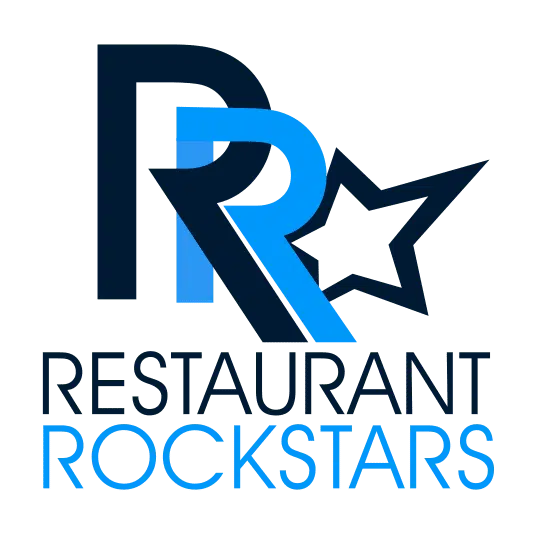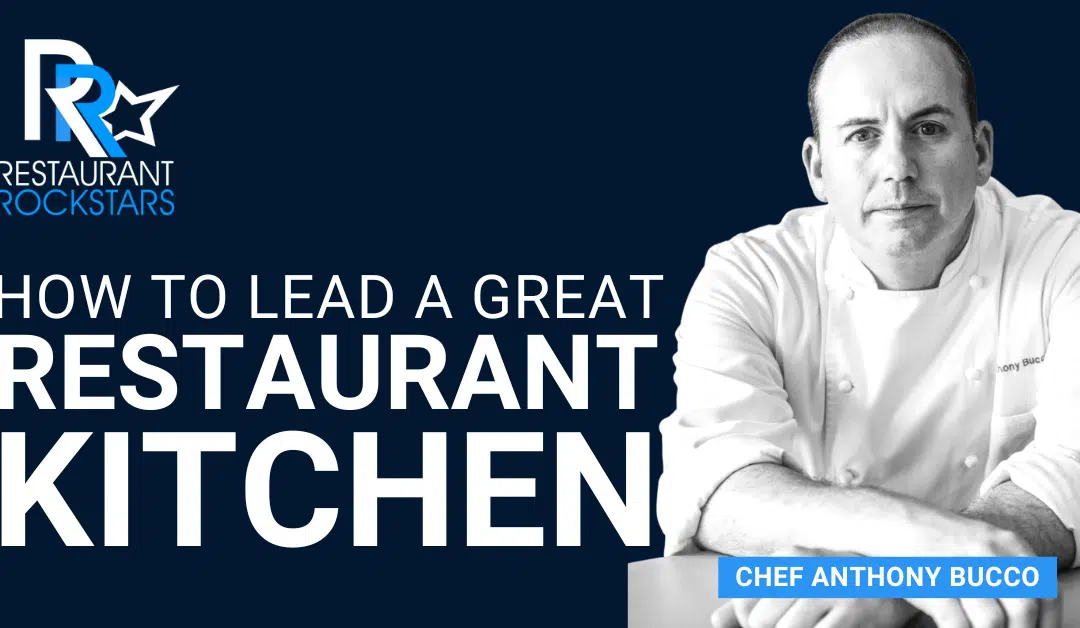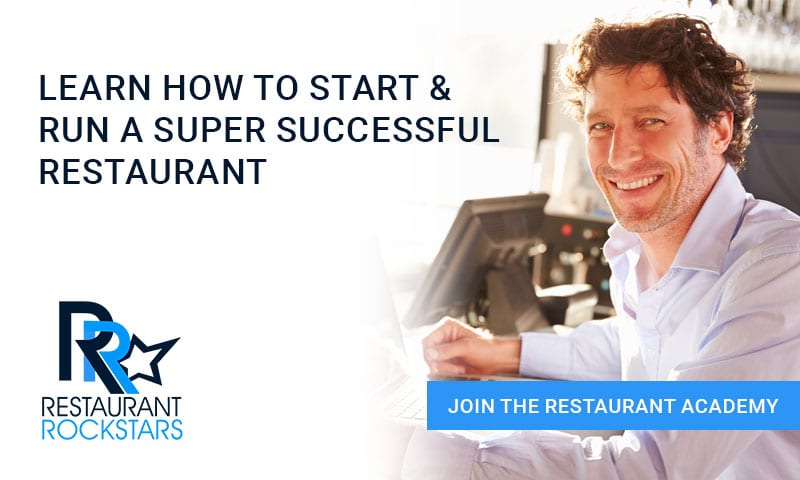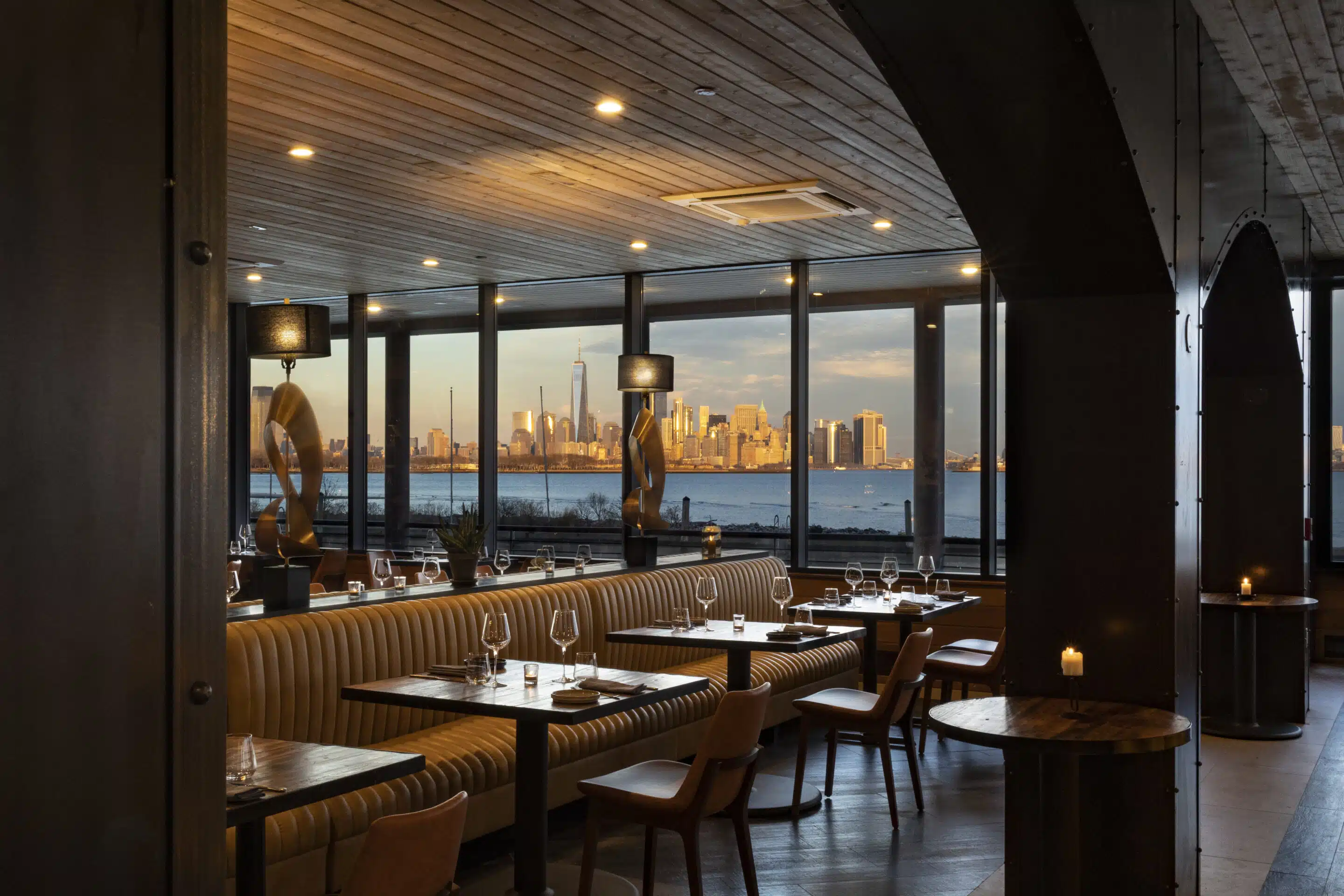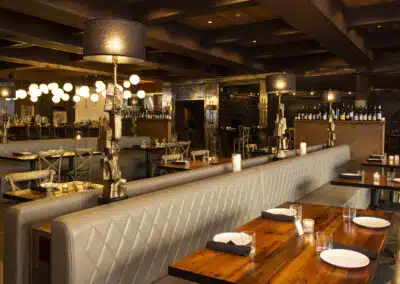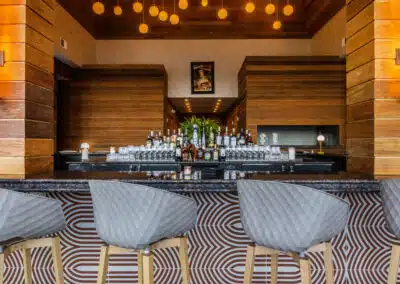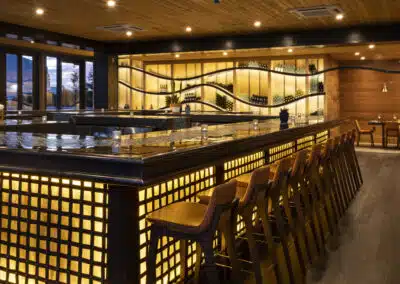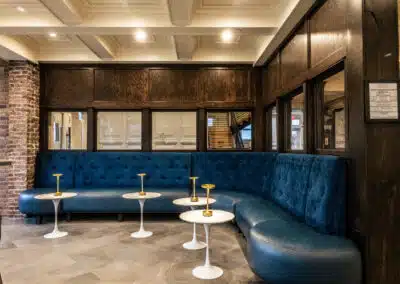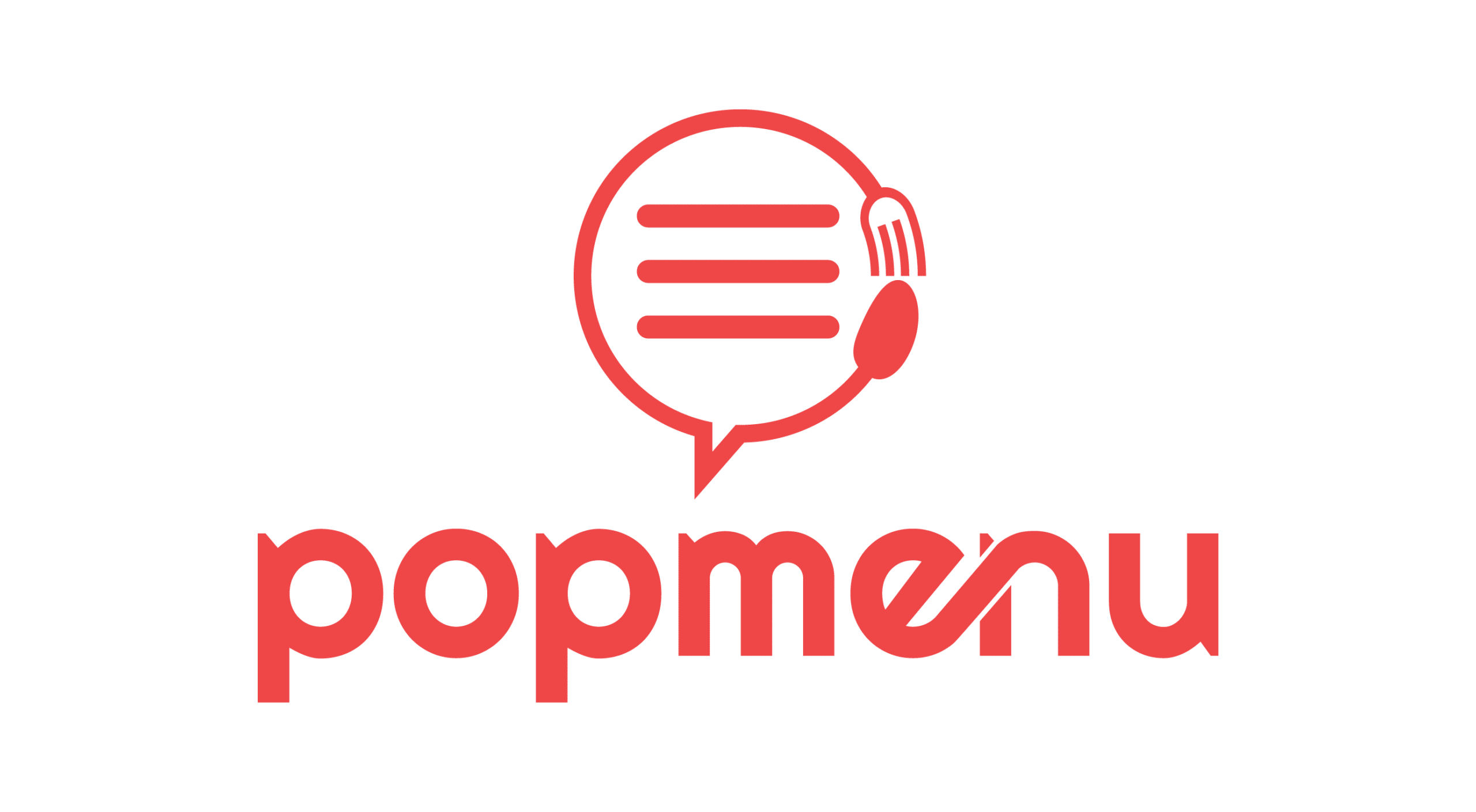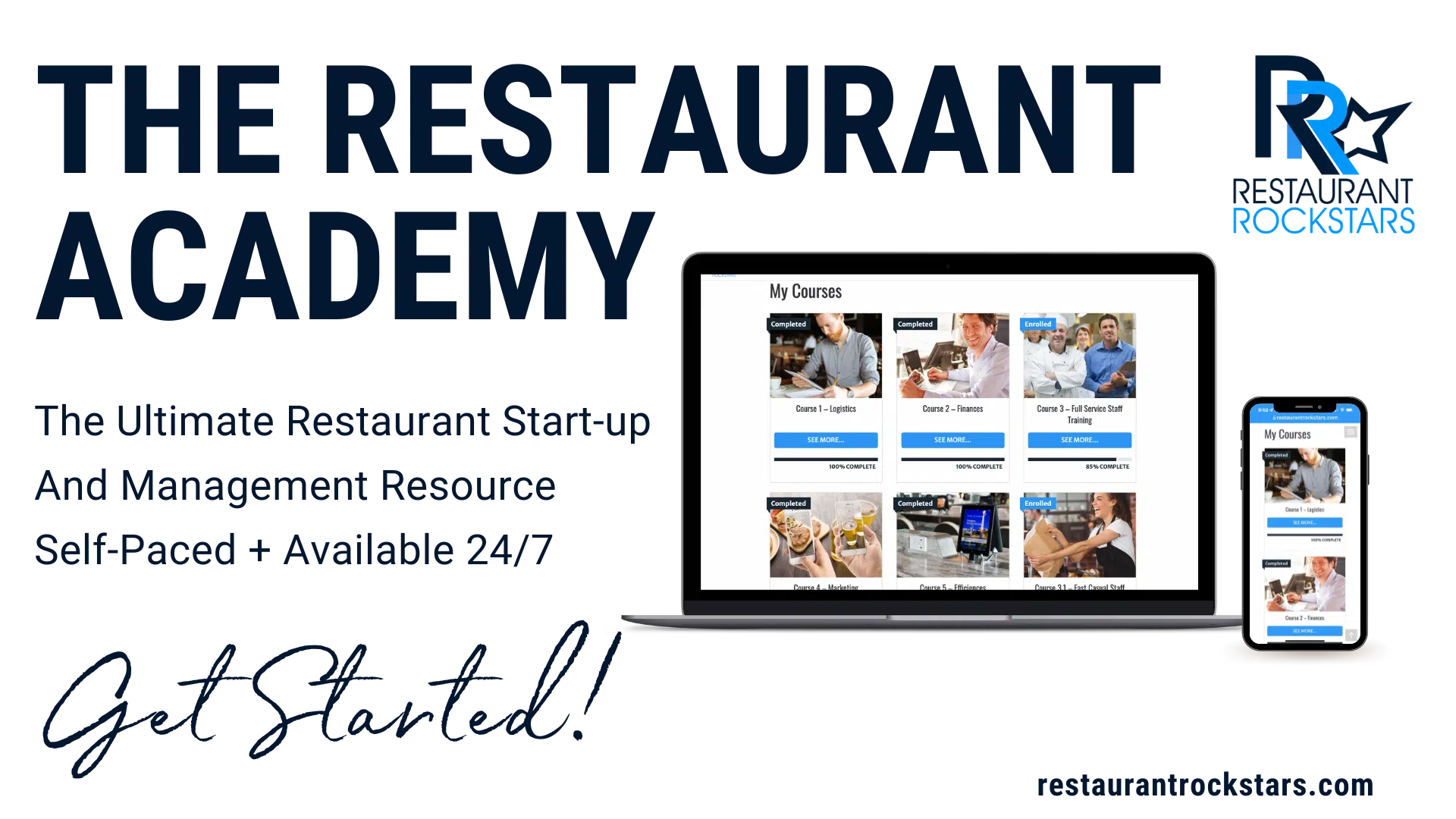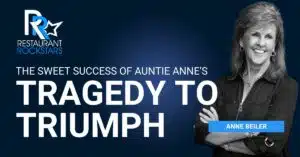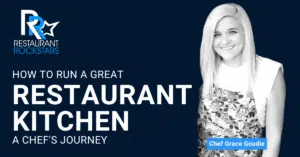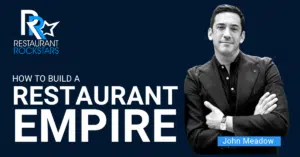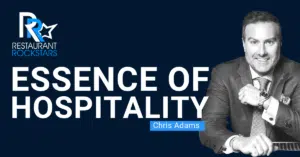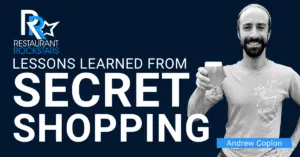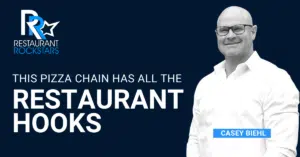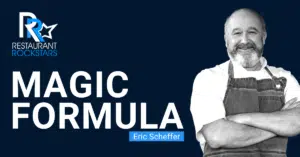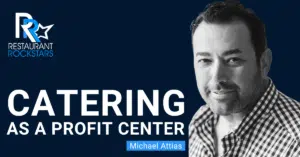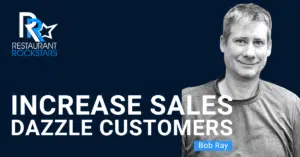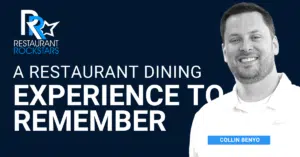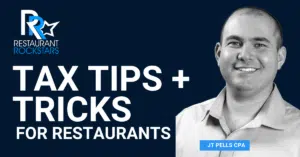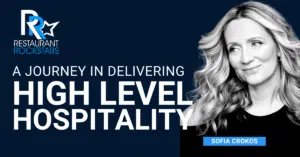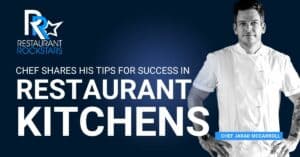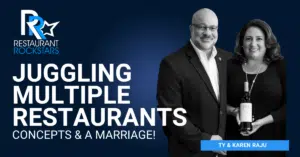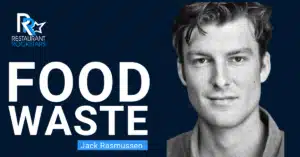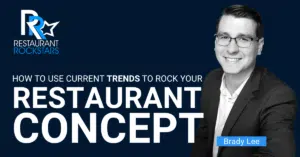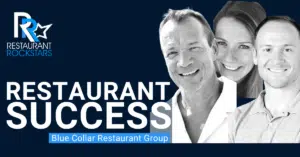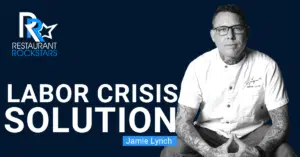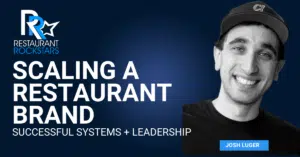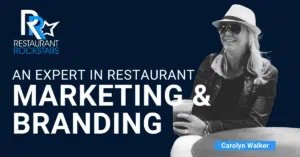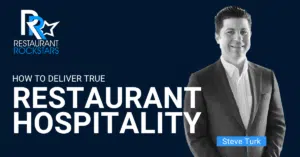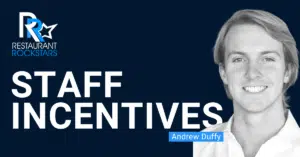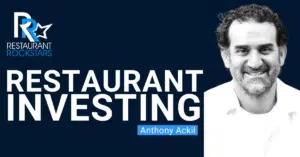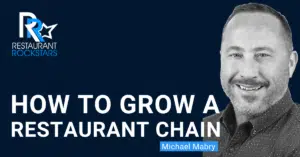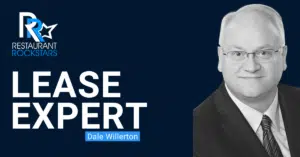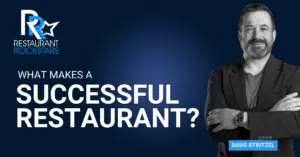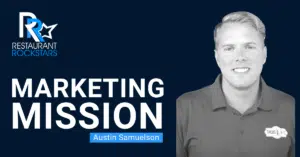Restaurant Rockstars Episode 364
How to Lead a Great Restaurant Kitchen
LISTEN HERE OR ON YOUR FAVORITE PODCAST PLAYER
Any great restaurant kitchen is the “Heart of House”.
Honoring this house requires creating a culture of passion, pride, and commitment to consistent quality. This takes a unique leader who both inspires, teaches, recognizes talent, and elevates each and every guest experience from the culinary team right down to the dish pit.
In this episode of the Restaurant Rockstars Podcast, I’m speaking with Chef Anthony Bucco, the Senior VP of Culinary Operations for a dynamic family run restaurant group known for elevated dining experiences in historic properties.
Chef’s early hospitality beginnings began in his grandmother’s kitchen where the culture of food brought family closer together. Ambition through his pride, passion and hard work rose Chef to the top of our industry.
Watch or listen as Chef Bucco talks about how to run a great restaurant kitchen including:
- Early cooking influences and how a culinary career path was developed
- How to inspire, train and nurture a great restaurant kitchen team
- The balance of leadership style and motivation for onboarding and training
- Delivering true value to guests and never skimping on quality
- Restaurant kitchen efficiencies and finding economies of scale
- How to have the “big picture” to run multiple great kitchens and a commissary.
- The challenges of maintaining margins amidst inflation and high labor cost
- Knowing and monitoring critical numbers and key-performance indicators
And of course, menu development, R & D and recognizing influential guests
Don’t miss this episode, then go out there and ROCK your Restaurant!
Roger
Connect with our guest:
IG @storkclubjc
Thanks for joining me once again on the podcast. My guest today is Chef Anthony Bucco, who is the Senior Vice President of culinary operations for a really dynamic operation in New Jersey called landmark hospitality. And landmark hospitality has really beautiful spaces that are historically significant properties. But we go into such detail today on what it really means to run a great kitchen, and how young people can get involved in this industry and what they can bring to the table to really rise to amazing challenges and to learn and to grow in the culinary profession. We talk about what a great kitchen is all about and company culture and leadership and inflation, and rising costs, labor and supply chain issues, all the things affecting you today. This company is doing it all. Well, we talk about the economies that come from having, you know, a Commissary Kitchen, amazing episode you’re not gonna want to miss so stay tuned. They’ve got their systems dialed speaking of systems, please check out our restaurant rockstars Academy at restaurant rockstars.com It’s a series of systems that you can now give access to 25 people on your team to help you run a stronger, more efficient and more profitable business. It’s cost controls and profit maximization, its staff training for service hospitality and salesmanship. It’s true leadership and accountability and its marketing with true ROI, you know, return on investment or ROI for very little money. So very powerful program at restaurantrockstars.com Thanks so much to our sponsors. Now on with the episode.
You’re tuned in to the restaurant rockstars podcast, powerful ideas to rock your restaurant, here’s your host Roger Beaudoin.
Listen from one restaurateur to another, and I hope you GMs out there listening as well or paying attention. You know, marketing should never be an experiment. Oh, I tried this or I tried that. No, any of your valuable dollars that you spend on marketing should absolutely be trackable. You should know exactly where the business is coming from and that it’s driving return on your investment. You spend a certain amount of money, you want to make far more money in return from that marketing, if you can track it. So pay attention. My friend Dyson runs a business called the birthday club and his program is done for you. Because we know that everybody dines out on their birthday. It’s a tradition, it’s a celebration. But not only do they not come in by themselves, they bring many friends with them. They usually have free spending and large check averages. It’s very profitable business. So why leave it to chance Why let your competitors get all the birthday business. So again, the birthday Club is a done for you program. All you have to do is check out www.jointhebirthdayclub.com/Rockstar. It’s a great program. If I still owned and operated Restaurants today after decades. It’s something I would definitely be doing but it’s worth checking out. So check it out. Join Thebirthdayclub.com/rockstar.
The busiest time of the year is coming is your staff are ready for the holiday rush. Well this year give your team the gift of pop menu AI answering a simple solution for phones ringing off the hook. Ai answering handles calls 24/7 365 days a year so your staff can focus on in person guests. Customize your greetings and responses, answer common questions, promote specials and events and send follow up links to ordering and reservations. Ai answering handles it all while escalating more complex conversations back to your team. Now never miss another tasty revenue opportunity. Pop menu is the marketing technology platform designed to make growing your restaurant easy. Discover more AI restaurant tools that turn your to do list into an already done list requested demo today and my listeners for a limited time will get $100 off their first month plus lock in one unchanging monthly rate. Go now to popmenu.com/rockstars again, get $100 off your first month at popmenu.com/rockstars.
Welcome back everyone to the restaurant rockstars podcast and Anthony, how are you today? Glad to have you on the show.
Listen, it’s a pleasure. Thanks for having me.
Well, the chefs are heart of the house in every organization and there’s so much that you can share with us and I love chef episodes because we’re gonna dive deep into what running great kitchens is really all about. And I know we have a lot of experience there to share. But our episodes always begin with the hospitality or culinary backstory of my guests. So please tell us your story.
It’s it’s kind of interesting and I think you know I came up At a time before there was the real true launch of of what it meant to be an American chef. And I guess it’s a both a positive and kind of a little scary, you know, so at the time, there wasn’t a lot of media associated with culinary and kitchens and restaurants in general, it was kind of on on right before on the cusp of kind of the launch of the new American concept of cooking that really kind of took the country by storm, farm to table movement, the whole nine yards, I was lucky enough to grow up kind of, I guess, at the apron strings that my grandmother, and I have a very large, extended Italian American family. And the one thing that was always kind of the galvanizing kind of aspect of all family events was obviously her cooking. And just her sheer, I guess, at this point in life, I understand it as hospitality, the way that you can kind of pull people together just to kind of really appreciate each other’s company. And, you know, it always kind of occurred over the course of a meal, I was kind of a young man who didn’t really have a great direction in regards to what I wanted to be when I grew up. And coming out of high school and transitioning into college wasn’t really giving me the answers I was looking for. Coming from a working class family, I had a full time position after high school, and I was Believe it or not a frozen food manager in a supermarket. And there was opportunity and some upward mobility within that. But I didn’t really see myself as that being the end all be all. And like I say, pursuing college wasn’t really giving me the answers for what I wanted for my future. The one parallel in life always came back to the celebration and my love and enjoyment for food. And it’s funny, because the one thing that I always tell everybody, I think, you know, to be a really good culinary kind of figure a chef, if you will, you really have to enjoy eating. And I think that was the one thing that kind of really kind of connected the dots for me, when you would love eating, obviously, there’s no better way to kind of enhance that and learning how to cook. Again, not a lot of information out there at the time, you know, there were culinary schools, CIA, obviously, Johnson and Wales, there were some New York schools, being you know, native to New Jersey and having to kind of work through through the process, it made sense for me to look at New York City as an option for Culinary Education. And, you know, again, I’d love to tell you that I did the due diligence, and I visited and I really kind of worked my way through the different opportunities, and like I say, did the research on the different culinary programs. I didn’t, you know, it was something that was a little more impulsive. And they ended up going to the New York restaurant school 75 Varick Street, which was kind of an interesting thing. And the programming was even more interesting because it was weekends. It wasn’t an Associate’s program, it was more or less just an opportunity to grab a certificate, service certificate and culinary arts didn’t really know much about what that meant, or what it would do for me. And honestly, hindsight, it’s a lot of things. But you know, if I can go back in time, I probably would have pivoted or changed my direction. I did it. And I went through the program. And you know, I did it while I was working full time, and kind of gave me I guess, I’m not going to say, a huge baptism by fire, but give me enough information, I guess, to kind of get into the industry and more importantly, connected me with a great externship. And that was really where my education began. And that’s really kind of like the start of my career. So I look at the start of my career. Again, school was impactful, because it put me on course, but the reality is, is the first opportunity I had in the industry was what really shaped me. And that stood with me and sticks with me to this day, because I recognize the value of any new individual that we bring into our organization, and how impactful in some cases, their first opportunity is for really setting the path for them to be successful throughout their career. Yeah, and it’s something you know, I think a lot of the lessons that we kind of internalize and where we place our value really does resonate and translate it to how we kind of groom and grow our teams. And that’s kind of been my signature, I had the opportunity, like I say, with the externship to really learn. And when I say learn, you know, cooking makes up a really small percentage of what it means to be a chef, you know, having the integrity and the passion and, and obviously, being able to connect to people is really at the forefront of everything we do. Relationships, as you know, are paramount. And it’s important for me to kind of respect kind of my roots in my upbringing in this industry. And really the fact that somebody took the time, the energy and dealt with the highs and lows of grooming and growing talent, it’s not an easy thing to do. And it requires a great amount of patience. But when somebody has, you know, the selflessness and the empathy to kind of work with somebody who really is uncomfortable in their skin at that point in their career, and really get them to believe in something. And it’s funny when I say something, really it comes down to believing in yourself. And the lessons in our industry aren’t always, it always doesn’t seem like it’s that clean, or it’s that. You know that that’s the true purpose. But I really do believe that, you know, the first opportunity and growing Self confidence is really what put somebody on a path to being successful. And like I say, even though sometimes the lessons aren’t always as clear and concise, they’re effective and that’s when you really start to see The transition of somebody coming in, and when they start to get confident in their actions, you really start to be able to measure their growth. And I think that’s one of the most exciting things like I say, for me to see. But growing into it was something that was so impactful for me the lessons and understanding that every action gives you the opportunity to take on a new responsibility, and really taking those responsibilities seriously. And then really starting to grow something and understand and really kind of dedicate yourself to, you know, to the path of, at the end of the day, making people happy at the table.
Well, you said so many things that I want to unpack a little for, first of all, we talked about this being a celebration of food, and it really is, and obviously everyone around the world needs to eat. But food is really something that brings cultures, different people together all around the world. And celebration really sums it up. And there’s so many special occasions why people go out to restaurants. But really making an event out of food is really what it’s all about. But then we talked about your path to becoming, obviously a leading chef in the industry. And it strikes me that there’s three ways to do that you can either, you know, have a motivation and realize you love cooking, you want to go to culinary school and learn everything that culinary skill has to offer. Or you can apprentice under an existing chef and be mentored. Or you can just be a line cook that might be listening, this podcast today that loves cooking and just, you know, maybe doesn’t have the resources to go to culinary school realizes he loves or he or she loves doing what they do. But it’s like, there is a path to the very top regardless of how you start. As long as you’ve got that passion, you’ve got a willingness to learn, and you apply yourself completely. And I’m getting the sense that you’re a real nurturing chef within your organization, and you come across all types of people that work in your kitchens. And you can you can make a real impact in someone’s life and show them you don’t need a formal culinary education you can get there on your own. Would you agree with that? I mean, do you see that happening?
I’ve ever said, I think you know, the path. This industry offers opportunity, because of just what you said there are multiple paths to get to your ultimate destination. And the one thing that I’ve always appreciated is that doesn’t preclude or you know, that it’s there’s no set of of pedigree that’s required. And there’s really no right way to get to your ultimate desired, you know, destination, I think that really comes down to the things that you just mentioned, you know, a dedication to something, anything is what really put somebody on the path to success. And ultimately, and I say this, because I’ve always said chips tend to be selfish. And I’ll go into more of this later on, especially when we speak about flavor and building dishes. Yeah. But I think the other part of this is like, I think everyone who comes into this industry has is always has the intent to do a great job. And always make sure that we’re making people happy. And and I say this, it’s funny, because there’s a certain element of of, of being in a culinary environment that, you know, there’s some some negativity and there are some things that obviously, you know, that they’re associated with the stress and the environment of being on constant deadlines. But at the end of the day, our sole responsibility is truly to make people happy, whether that’s through an expression of creativity, whether that’s through sound business practice, whether that’s the relationship building, it’s it’s all kind of comes together and to into one perfect kind of swell if you well. I like the idea that people from different backgrounds can achieve success. And it’s really just as simple as kind of making the dedication to themselves before they make the dedication to me or the businesses and I and that’s kind of like the theme of selfishness, like, I want somebody who has pride and self respect, and again, self confidence and really wants something for themselves. Because that’s the easiest person to attach skill, responsibility, and really technique and you know, they they kind of run with it from there. You know, I’ve always said, being a mentor is easy when you have people who want to grow and want to succeed. And their success is not mine, it’s theirs. I like to believe that you can create an environment that’s conducive to people being successful, and they just naturally attach themselves and their growth is their growth, they own that. And I like to be a conduit, and I like to be able to provide healthy environments for people to grow and nurture. But ultimately, their successes, they own it. It’s it’s theirs I, you know, I I’ve had the pleasure in the luxury of getting a lot of press through my career that speaks to the fact that I am a mentor. I like it because I think it’s something that kind of shows that I’ve created environments that are conducive to learning and growth. But ultimately, it’s their success. It’s not mine. And that’s one thing that I always try to be very clear with, especially when I’m talking to anyone is, you know, their growth, their success is theirs. And I think that’s an important kind of point.
Well, don’t downplay your role, because you could be a catalyst to great things, great people achieving great accomplishments, and I’m sure that’s already happened and it continues to happen and you’re humble by saying it’s not your success. It’s theirs and true. They’ve done the work that you’ve done the work also but It’s really gratifying, what I’m hearing is extremely gratifying and it makes your job worthwhile in that one area on top of everything else you do that provides great culinary experiences for your guests in some pretty amazing properties. So I love that whole piece. Let’s talk a little bit about what you did after school and some of the gigs that you might have had along the way that led you to where you are today. And maybe some of the things that stand out to you is really, you know, landmark experiences before you got to landmark.
No, it’s, it’s, it’s a great kind of jumping off point. And the one thing that I will say, and again, naive as I may have been, you know, the reality of being able to serve, you know, the the industry, in any hospitality capacity, whether it’s a sommelier, whether it’s a bartender, whether it’s server, you know, server, Assistant, Chef, wine, cook, whatever the case may be, is the fact that it opens you up to numerous opportunities that don’t necessarily just occur within the context of where you’re from. And the one thing that I’ve always kind of prided this industry on is not only the chance to kind of be successful in your own market, but to kind of grow beyond that, you know, one of the things that I’ve had the luxury of doing is, is kind of working throughout the country and kind of doing some startups with, with some celebrity chefs. And it’s been kind of an incredible value for me, to kind of see how, you know, what, what patterns, trends, behaviors, attitudes, that the like, are like, in other markets, you know, so that’s something that obviously I look at is kind of an exciting part of my growth as a human Not, not to mention, just obviously, as a chef, you know, it’s put me in places that frankly, I don’t deserve to be in and I say that kind of tongue in cheek, but I do mean it, you know, I’ve been to so many once in a lifetime, you know, moments, you know, I’ve been at weddings, and I say weddings, like more from the standpoint of servicing them. As you know, from a culinary standpoint, you know, I’ve been at events, you know, one of the first positions that I had as, as a line cook was in New York City, we had, you know, and mirrored Restaurant Group, and we had taken over kind of food operations or started food operations at the W Hotel, that literally just kicked off, it was their first location across from the Waldorf Astoria, we did a we did an event for the Dalai Lama and Nelson Mandela, I mean, you know, in here, it was a young guy, and you don’t really put context around things to kind of look back the amount of moments and the amount of places you’ve been that you’ve shared with people that, frankly, you know, in some cases, you don’t have a seat at the table. But you’re there. And I think, you know, there’s something really to be said for that, you know, on any given night, in any one of our landmark locations, or any location period that I’ve had the luxury of actually being able to kind of spend time at, you know, it’s celebration. In some cases, in some cases, it’s just an escape from the day, in some cases, it’s just an opportunity to kind of have a one off date with your wife. In some cases, you know, that there is, you know, somebody graduated and bad cases, you know, you lost somebody, you know, important in your life, and you’re just going out to forget about it. You know, the one thing that is associated with hospitality, and it’s something that I take very seriously is the amount of time that we get to spend servicing those and being a part of something that’s special to somebody else. And there’s a selfless nature that I think you start to see, as you start to grow through this, where it’s like, you know, there’s a lot that precede somebody walking in your front door. And yeah, a lot of times that has a lot to do with marketing, public relations, you know, and trying to drive business. But on the other side of it, it has to do with the fact that you’ve created an environment that is that special enough that somebody wants to celebrate. And it’s a big responsibility for a chef.
No question about that. That’s awesome. So you’re the Senior Vice President of Culinary operations for landmark hospitality. So that sounds like an incredible position that takes you in a lot of different areas. But is there a typical day for you? Is every day absolutely different? And what do you really enjoy about what you do?
No, two days are the same. Sometimes I wish they were because I think it’d be a lot more productive. But we don’t have to put that on it. I’m only teasing. You know, it’s funny, I have, I have the luxury and when I say that I’m working with multiple restaurant teams. And then we have some of our properties, which is venue only. So we only do like high volume, high end catering. And there’s a balance between obviously what happens on you know, in a restaurant and what happens in an event space, both are equally important and both obviously require the same amount of bandwidth to make sure that we’re checking boxes and, and really putting our best foot forward to execute. To that point, my responsibilities are pretty diverse. In many cases, it’s really being, you know, in on the field coach and and kind of observing what’s happening, figuring out opportunities for us to create efficiencies, whether through purchasing, whether through stepping, whether through training and grooming. In some cases, it’s it’s hands on, you know, we’ve got some VIPs coming in that but it’s important that we put our best foot forward and you know, there’s an opportunity for me to kind of help with the expression of those flavors and, and making sure that there’s, you know, that the execution is handled, you know, through my through my hands in Some cases, it’s it’s creating programming. That’s not, we’re not even going to be tasting or working with for a couple months. But it’s important for us to start to structure and stage out what next phase menus look like, in some cases, its designing kitchens for restaurants that are coming around around the corner, working with, with human resources to kind of look at talent, you know, start the recruitment process, try to determine based on concept where we see the best pieces falling and in terms of the the human capital aspect, and then really, you know, investing time in the people really working towards you know, and it’s an overused word, I get that, but really working towards the establishment of a culture, and making sure that you know, we’re able to maintain it. And not only just just through you know, just the words, but more importantly, through actions and making sure that our teams are are put in positions to succeed. And more importantly, there is a growth and development opportunity for each and every person in our in our organization.
Excellent. That’s awesome. no typical day. But all of those things sound amazingly gratifying. Let me ask you, let’s go back to that question about the line cook that might be listening to this. Because there are a lot of line cooks. And some of them think, Hey, I’m pretty good at what I do. And I really care about what I do. But I don’t really see any upward mobility in the typical restaurant. But I may not necessarily know how to get into an illustrious Restaurant Group, or how I can go from an average place to a place it’s really going to help me to grow where my career is going to take a leap forward. Do you have any best advice about that, because I know there are a lot of people that have so much potential, but they’re not making maybe what they deserve. And you know, there’s there’s much greater opportunity as you rise up in the organization, but they may not know how to go after that, or how to take the initiative. You mentioned human resources department at Landmark. But what’s your best advice to someone who thinks they got the right stuff, they just don’t know how to take their career to the next level.
I come from a generation and I say this kind of tongue in cheek, that I responded, the first few positions that I had actually were posted in the newspaper, you would send snail mail a resume, and two, three weeks later, you get a call back. And that was the process. And then when you start working in the industry, you start to kind of connect with the with the culinary, you know, whether your colleagues and your peers next year, even sous chefs or chefs and it’s like, you know, everyone would always tell you on your days off, you know, you knock on the back door of a kitchen, you have your knife roll, your shoes are polished, and you walk in and you do a stopwatch. And it’s a great way to network, learn new things, and more importantly, put yourself out there, you know, the days those days have changed. I mean, obviously, and thankfully, that’s not the case, there are a few things that actually kind of expedite and speed up that process. Number one, I’ve always looked at an opportunity for networking, on any level, I think, you know, again, previous, you know, iterations of my life that wasn’t available. But today’s social media has become such a valuable asset not only to chefs, but also the line cooks and everyone in anyone for that matter. The best way to connect and expand your social network and put yourself out there is whether you’re sliding into the DMS on Instagram or direct messaging somebody on on LinkedIn, or any of the social platforms for that matter, and just making a brief introduction to who you are and what you’re you know where you are, and more importantly, what you want. You know, there’s nothing wrong with networking. And I think putting yourself out there. And social media gives us so much access to so many different different personalities and different businesses. And it’s a really good opportunity to connect with people. And I don’t think there’s anything wrong with kind of reaching out to anybody at any every one for that matter, just to kind of make an introduction and kind of explain who you are and where you see yourself going. And maybe how you could be a benefit or, or how you know how that the industry could benefit you by being a part of an organization.
Great advice. And you would still probably recommend people to bring their knife roll to an interview. And maybe you’re going to be auditioned on the spot, right? Where you’re suddenly Hey, show me what you got, before I decide to hire you. I want to see your skill set and give them some basic things to do that show you if they’ve got the right stuff, at least the foundational elements, right?
Well, that that is, is one one angle, I also look at it as the benefit to the employee. The one thing that I you know, again, and I said it earlier, and it’s somewhat overused, because it is but like, you know, you want to make sure you’re a fit for the organization’s culture yourself. And the one thing that I I’ve always found is anytime that I’ve had a chance to spend a day or a week, or whatever the case may be is as a stodg in a kitchen, is you also pick up pretty quickly on what the culture is at that specific kitchen and whether or not it’s a fit for you. You know, it’s Listen, we the story is told through social media in a great way, but it’s also a very skewed view, when you have feet on the ground and a kitchen and you get to see how people interact with one another what you know, what expectations are, you know, seriously are you know, what’s the cleanliness? What are the sanitation practices where you know, where is attention paid? I think it really gives you a stronger idea as to whether or not you want to be a part of that organization. So I look at it as as kind of a dual benefit. I see it you know, from my perspective as they get to see somebody come in and do they have the wherewithal you know, the reality as a chef is everyone can be trained. When the other reality is is no one ever walks into a new opportunity with the intent on doing a bad job. So I look at it as the structure in the organization is as equally as, as as responsible for somebody’s success as that individual is. So I look less as like the first day of somebody coming into a room and you know, the nervous energy and everything around that I look at it as more as that opportunity for the individual to really qualify, is this an opportunity that’s appropriate for them? And are these individuals who I can learn from? Do I feel comfortable here? Can I grow? Can I Can I really kind of come into my own in this in this this particular location? And I think that there’s value to that more for the employee than the employer.
I see that value. Absolutely. Well, you’ve got beautiful properties, their historic properties, let’s talk about the history of the landmark hospitality brand. Tell us where it all began. And the foundational, you know, story behind landmark.
No, I listen, you know, Frank and Jeanne Katella are amazing people. And I say that I want the emphasis to be on amazing people before I say amazing restaurant tours, operators, however you want to define them. And there is a trickle down effect. And and I really feel passionate about saying this, you know, the trickle down effect from what their vision was for what landmark started at. And again, like this story is kind of funny, and it’d be better suited to hear from Frank, but I’ll share it with you. You know, they went to see a Pavarotti concert at in Liberty State Park in Jersey City and Jersey City at the time wasn’t what Jersey City has really grown into in recent time. And it was distressed and you know, it’s a state park. But it wasn’t something that was necessarily at the forefront of being kind of honestly gentrified. But but you know, really kind of put on the path to what it’s become. And they saw the potential in a piece of, you know, a couple pieces of steel coming out of the ground. And you know, the one thing that I’ve always found with both ranking genius, they see potential in something that most people can’t. And with Frank, you know, going into a lot of these historical buildings and seeing how he can transform them, while obviously preserving a lot of what it is that makes them so special. Virginia walks in and sees how she can kind of create a hospitality option that really can speak to the community. For me, I see a kind of hybrid of both, I have some opportunity to help Frank on the development side. And obviously I spearhead the culinary on the hospitality side. But really the kind of the the match of those two philosophies to kind of come in and bring it to life is something that’s really amazing to me, you know, our properties do have age, and they do have history and the history that they have, really, it’s important to say this because it precedes us. And from a culinary standpoint, you know, my first entry into landmark hospitality was with the island in, you know, the island in in many ways, is the most iconic restaurant. And I say back then it was a restaurant. Now, it’s kind of transitioned to both having an ala carte format, but more importantly, is really heavily focused on the catering side. Not necessarily low carb, I apologize, but having events program to the public, and then obviously, the catering side. But when I went, it was something that was was interesting to me, because I was following up on a chef who had multiple James Beard Awards was on the cover of Gourmet magazine. And the culinary history there in some cases can be quite intimidating. But on the flip side of that, it was also something that if something’s been done before you, it’s obviously well respected, but more importantly, gives you an opportunity to grow on it. And I never looked at myself as in competition with what had occurred prior to my arrival, it was more about kind of carrying on a legacy. And the one thing that I think we’ve always done and tastefully is anything that has had a history, when we’ve come in, we’ve been very respectful of not only its history, but we’re not looking to kind of, you know, to kind of to change its history, we’re looking to enhance it and help tell a new story, while being very respectful to the story that preceded us. And I think that really does define a lot of our properties that had pre existing, you know, similar like, like uses. And in any case that that wasn’t, you know, where we’ve taken over a historical building that didn’t have a hospitality history, it’s almost kind of creating something that would have been reflective of the period of the building was built, and kind of really capturing that and taking that and kind of transforming our brand into the preservation of the historical building, most most notably, but almost pretending that we served in this capacity, not pretending, creating, you know, the branding around the fact that this could have been something that’s been here for, you know, 75 years, and really kind of looking at that and connecting to communities in an impactful strong way and really kind of looking at our offerings, making sure they make sense for the space. We’re serving them in.
Wonderful. You mentioned Pavarotti’s and Liberty Park. Tell us about your flagship property than some of your other concepts like bring them to life for us.
Listen, when I ran restaurants, I had my core values the things most important how I ran my restaurants, monitoring daily operations, training my team for consistently great guest experiences food safety, quality assurance and preventative maintenance. All this took a system well, here’s what Xenia can do, Xenia gives you a modern app, really an operational Basecamp. That scales, standard operating procedures, trains, your team controls, operations, and even manages food safety. Now I really like their sensors that continuously monitor temperature for fridges and freezers so you can proactively prevent inventory losses. And how valuable is that. Now, whether managing a single or multiple locations, the Xenia app helps you ensure consistency, compliance and accountability across your operation. You can see full detail in real time from anywhere in your Xenia dashboard with automated reports right to your inbox. Now again, this was vital in my restaurants. Xenia is offering my listeners white glove service with free onboarding and implementation. So you can jump straight into immediate usage and value. Xenia starts at just $69 per month per location. So get my special deal at www.Xenia.team/rockstars. Xenia is spelled X e n i a.
Yeah. So again, like I say, I think it’s now 24 years ago, you know that that business opened as Liberty House we recently transitioned to, to a brand change there, and now it’s under the guys of Betty rose.
Oh, right. After the founders daughter,
correct Yeah, no, and I think a lot of that has, it’s really important to kind of say that, because I think the one thing that we’ve always had as a company, the ability to do is really make sure that we stay relevant. And when I say relevant, you know, you have to understand when this restaurant that that venue opened, 24 years ago, the level of competition, the really the level of just everything, the playing field in Jersey City was completely different. You know, over the years, there’s been multiple pivots, and there’s been some transition in terms of, you know, maybe the look and feel of the dining room, or the look and feel of the menu fonts, or even like maybe an approach to social media, this is a real strong kind of turn in a different direction, where we’re starting to realize that, you know, for us, we have something that’s I don’t want to say institutional, because I don’t believe that that does adjust this, but something that there’s a certain level of, of, of connection. And for us, it was about creating something within the comfort of that connection, that started to elevate and transition the way people think about what we’re doing there, not rule out or push somebody away from it, because it’s not the same, but really look at enhancing and kind of changing and growing the business model, by really kind of looking at it from a ground up kind of almost transition. You know, Maddie is an important part of landmark, you know, both today and into the future. And I think Frank and Jeanne respectfully understand that as we look to appeal to different demographics, and as we’ve seen the transition of Jersey City and how you know, how guest behaviors have kind of changed and modified, we felt this is a good time for us to kind of look at that business model and really kind of transition it so Maddie rows is kind of our, our vision of what Liberty House looks like not only today, but where we see it going into the future. And how we appeal to, you know, to the next generation of diners, the next generation of brides and grooms and, and where we see, you know, our version of of Liberty House kind of growing and morphing to be more relevant to today’s market. To a lesser extent, we’ve looked at our other concepts, and when I say a lesser extent, because that’s our longest running concept, okay, you know, everything else is kind of modified based on kind of current time, and in a lot of cases, many of our restaurants are less than five years old. So it’s a little less impactful to do a concept change when you’re, you know, when you don’t have a decade of experience where we looked at really the biggest splash and opportunity for us to transition. And that’s where like, you know, the Liberty House transition to medi Rose was something that was really important to us as a company. And, you know, it’s a big investment of time, energy. And I think, you know, it’s really paying off, what we’ve seen is we’ve seen kind of growth in our in our client base. And more importantly, we haven’t seen the alienation of anyone who had used our restaurant in the past. And I think that’s a testament to, you know, to kind of making sure that we were respectful of the past, no different than what we’re developing. And more importantly, you know, we’re looking with a key eye to the future of how we can continue to make impactful guest experiences happen at that beautiful venue.
I’ve always been a fan of history, I’ve always had a great interest in historic things of all, you know, of all types and varieties. And I think there’s a certain huge interest level on the guests part to know the history of a space and what it used to be and the generations that have passed through it and what it used to be versus what it is now. I mean, that’s a draw unto itself, in a very subtle way of marketing. It’s like historic properties have a great interest and if you can create a beautiful space, but maintain that history, as you said, and provide a really amazing dining experience. It’s a celebration of food. It’s like what a win win that is, and that’s exactly what you’re doing. That’s terrific. So is Maddie. Now following in footsteps and involved in the business.
She is yeah, you know, Maddie runs are she has a lot of responsibility. And it’s kind of funny, I think one of the earlier questions that we one of the topics we had to cover before it’s just the day in the life and you know, is there any two days that are the same, I don’t want to speak for anybody, but I will speak for her in this case, she has no two days that are the same, you know, Maddies responsibilities really are on the marketing side. But keep in mind, you know, there is an operational need. And a lot of that comes from the fact that she’s the namesake of the restaurant. And you know, the one thing that’s always been kind of, kind of important to us as a company is to make sure that we’re there and able to kind of greet meet as many people as we can, you know, having multiple venues makes it a little harder for all of us. But ultimately, we do make sure that we’re there in front facing. So her responsibilities are quite unique. But again, most of her her oversight is really on the marketing department.
Well, that’s a legacy that’s going to continue, I’m sure, and it’ll be a generational thing to perhaps write her family and that sort of thing. I mean, it is a family business. And I love the fact that there’s a legacy here, and that she’s carrying on that tradition. That’s tremendous. Let’s talk about your culinary style and your influences. Obviously, as the Senior VP of culinary ops, you have huge influence on menus and on, you know, what gets presented to the guests and plate presentations, and seasonal menu changes and all that sort of thing. But every chef has their own personal style, what they really specialize in, but you got to be open minded to new trends as well. But I can’t speak for you tell us all about your style, your influences, and how you impact menus across the organization.
You know, this is this is obviously the most fun topic for me, because it’s something that I’m closest to, you know, the my I guess the easiest way for me to sum this up is kind of like I say, at the infancy of my career, I had an opportunity to work with somebody who really put a lot of stock and ingredients and the importance of them. Yes, and like I say, I mentioned, I kind of came on board in the industry, just at kind of the start of the farm to table movement, and really what it meant to be an American chef, and a lot of the roots of my foundational cooking skill really comes down to French technique. And I was lucky enough to kind of see this explosion of American chefs really start to make their impression on, you know, on an international market, and really started to value what it meant to cook with local ingredients. You know, the United States, historically, outside of a few areas never really had, you know, an identity. And and I think really, when we started to kind of look at what was coming from our farms, and what was grown locally, and seasonally available, really started to define the generation of talent. And that’s something that’s really important to me sourcing with integrity, making sure that things that we’re using have, have obviously, the height of of nutritional value, and they’re hyper seasonal, and when we can source local, and it makes sense, obviously, that’s another big part of of what we do, I would be remiss to say that, you know, my fundamental upbringing didn’t really influence the way that I cooked. You know, my grandmother, like I say, is a see an immigrant. For me, you know, like I say, being at the apron strings of her was kind of important to kind of draw a lot of influence from that. And I like to think that, you know, my combination of my personal background, you know, the, the influences that I’ve had both through travel, and obviously working in kitchens, has really shaped what I do. But I think the consistent theme there is is making sure that what we’re working with is the best possible product. And again, that comes more to nutritional value than costs. And that’s more associated with freshness and locality than anything else. There is a simplicity to preparation of food, which I say that and then I can tell you that it’s also incredibly complex, because making sure that something is balanced, whether it’s for salinity, acid, texture, those are all very important things. And I try to make sure that everything that I do kind of highlights every area of of the integrity of the product I’m working with, and really trying to drive home on all of those things to make sure that something is working on somebody’s palette in a way that’s both balanced, nuanced. And it’s really about building platforms of flavor, I find that my my technique, and obviously my my cooking patterns and sourcing, really have become the identity of my cuisine. So it’s, you know, there’s a, there’s a tie into, I don’t want to call it molecular gastronomy, because it’s kind of a little bit passe. But you know, we do work with science and cooking. But it really comes down to the integrity of ingredients. And when you’re developing and really driving, you know, multiple ala carte menus and catering, you know, menus, and the one consistency that I think you’ll see across our venues is really the passion and the integrity of which we source.
Yeah, I mean not so recent past obviously gluten free and dairy free and all these limitations have found their way into restaurant menus. And now it’s a must have like every restaurant menu needs to address all kinds of dietary concerns. And you must put great emphasis on that as well as that correct but without actually losing flavor profiles and having dishes tastes really amazing even though they may be dairy free and gluten free and all that like that’s a challenge. I would have guessed
it a challenge, but it’s also something that I look at as exciting, you know, there was a time and I remember this. And I mean, the one thing that I, I always wanted to make a point of doing. And I say this, like, you know, there was a time that there were very few vegetarians and vegans, and you know, that’s also become something that’s become a lot more prevalent. And, you know, at the beginning of my, my chef career, when I was running kitchens, the one thing I never wanted was anything to be a throwaway, oh, we have a vegetarian who sent our pasta, like, I never wanted it to be that. And it was something that I always prided myself on really being creative, and really energetic when it came to developing dishes that were, you know, not necessarily on the menu or the norm for our client base, or demographics. But something that was important enough that if somebody was in your dining room, you wanted to make sure you serve them and serve them? Well. I look at everything that’s going on today. And you’re right, you know, there are a lot more things floating out there, you know, it’s you’ve got now sesame is classified as an allergy. And there are a lot of different things that that kind of float on to the horizon. And we have to be aware of, you know, I’m not a doctor, I’m not a nutritionist, I’m a chef. And at the same time, it’s like, I have to kind of understand the importance of the health benefits and or to the opposite, where we can potentially hurt somebody, and take that very seriously. I pride myself on the fact that, you know, we’ve continued to push forward interesting programming, in lieu of gluten, in lieu of, of dairy and lactose in lieu of, you know, somebody who is looking, you know, to eliminate maybe protein animal based proteins, you know, and I look at that as, as, as a fun, interesting challenge. Like, you know, one of the things that we’re looking at, you know, as we’re programming events for 2024, is to incorporate some plant based events into our into our dining schedule, you know, maybe it’s tasting menu, or wine dinner that we do that’s plant based, you know, and I think that there’s a lot that can come from that. And I think it’s really important that as chefs and as operators that we embrace that, you know, everyone has different preferences, and more importantly, that we have to take that seriously, and, and really kind of figure out how we can adjust our programming. Again, to me, it’s being relevant. But more importantly, it’s, it’s easy to do when you’re when you’re ingredient based, you know, and it’s something that I think we can showcase things in a different way that are appealing across all all dietary needs and preferences.
Fantastic. So when I owned restaurants, it was always about playing our best game, but being constantly aware of what the competition is doing. So you as a, obviously a culinary? And do you shop, the competition? Do you keep up with what others are doing? Do you travel internationally to obviously see new trends and just constantly be bringing things to the forefront? In your concepts?
Absolutely, I think, you know, there comes a point in your learning curve, that, you know, again, there’s not really somebody in front of me from a culinary standpoint that I’m learning from. And at the same time, I learned from everybody. So I know that sounds a little contradictory. But you know what I mean, it’s like, anytime you pull somebody into an organization, you know, there’s always something they bring with them. So there’s always an opportunity to pull something, but from the standpoint of really kind of learning, it really comes down to reading and traveling. And to that point, I would tell you that anyone who tells you that they’re not paying attention to what’s going on probably isn’t being entirely truthful. Today, it’s a lot easier, you know, there’s a lot of things that actually float into your inbox, you know, whether it’s through social or whatever of what somebody’s doing, you get something from appear like, Oh, my God, did you see what’s going on in Chicago. And, you know, it’s, it’s always friend of mine presents. And I think, really, you know, completing the sensory experience of getting out and trying different things is really important, and paying attention to what’s going on. And, you know, again, the one thing that we have is a wealth of information at our fingertips literally now. And, you know, you’d be silly not to take advantage of that and kind of understand what’s happening. I’d like to believe, you know, just like anything else, I’ve always said, like, if I was doing an opening, I tried to kind of stay away from certain things, because I just wanted to have clarity, when it came to programming, what I felt the concept should look like, without having the influence from what’s going on. To that point, that when you’re actively cooking, I think it’s important to really kind of make sure that you’re aware of what’s happening, because you don’t want to fall behind and more importantly, you want to be pushing. And I think that there’s real value to that. And I think, you know, the reality of staying on top of what’s going on, you know, internationally, locally and beyond is really important. I had the luxury of heading to Madrid back in 2005 for Madrid fusion. And it was something that was was super impactful for me where I got to kind of be in a room with multiple chefs from multiple continents, you know, everybody from Ferghana, you know, and just to elderly to, you know, Heston Blumenthal at The Fat Duck to, you know, even domestically where you know, you had people like Dan Barber and ganache it’s and just an amazing kind of array of, of international talent talking about what brought them to the forefront of the industry. And, you know, there’s a lot of opportunity to draw from from things I remember when the Pellegrino top 50 came out I had an opportunity to visit the UK because I think out of the top 10 restaurants four of them were in London, and kind of had the chance to eat there and see what was going on and what was really driving Culinary internationally. So it’s definitely something I do and I will travel for food and work for food too. So
Wow, you’re bringing me back, I had an opportunity to live and work in Italy. And now in you know, Italian cooking and Italian wines are now huge in my in my life, but you have Italian roots you mentioned, you know, Sicily and all that, do you go back to Italy much.
So I have my father’s of sustained descent, my mother’s from Ireland. So I’ve spent more time in Ireland than I have in Italy, which is interesting. And it’s funny because when people think about Irish, you know, the, the food is never something that really surfaces in a way that it’s lauded for its for its great food, I will say this, I mean, there’s some of the best, you know, from dairy standpoint, from just overall, you know, fish and obviously, just the country is green. So So vegetation is amazing as well. There’s, there’s a really strong food culture there. It’s not as as refined I guess, as other places, although the oldest culinary school in the world is, is in Ireland. So there’s definitely some culinary roots there. I get a chance to go back and forth. On occasion, I would like to travel more. My last trip to Europe, I was in Portugal, which gets to see, you know, a whole different kind of aspect of of European sensibilities, and just even from their standpoint of their wine production. I mean, where they’ve kind of come in terms of love and industry is kind of impressive. But just Yeah, I mean, you can’t kind of do this and not go back and forth to the old world and kind of experience.
Yeah, I’ve spent some time in the UK and in Scotland, but I’ve never been to Ireland. So that’s on the bucket list. For sharing I bet it is. Let’s talk about your leadership philosophies and your leadership style. Tell us about that.
Do you think again, it comes down not to be cliche, but it does come down to leading by example. You know, I’m one of those people that believes in, you know, being present and being available, and more importantly, being playing a role in in my opportunities. And like I said, I’ll get to spend as much time as I’d like in a kitchen. But when I am there, I try to make sure that my impact is beneficial. And in some cases, it’s working kind of vicariously through some of the comments and concerns that I’m pulling in from, you know, from from our locations and our venues and really working on selves, when I go there to make sure that we have some takeaways. You know, today, again, the beauty of social media is I get to pick up a lot of things that may or may not be accurate, and photos and kind of help kind of solve those things from a distance. And when I get there, make sure that I’m actually working shoulder to shoulder with somebody, I really like that, that connection to people. And I like kind of being in their zone. And more importantly, I like to kind of get an understanding of what it is that they actually need. And sometimes it takes a little while to cut through that, you know, to get to the heart of the matter. But I really like to make sure that there’s things that are actionable and addressable. And you know, that there’s there’s some takeaways and more importantly, that things are getting addressed. I am a believer in effective communication, and I’m a believer and follow up. And I think that that kind of bar, those are two really important things as a leader that are necessary. You know, it’s, it’s, it’s one thing to talk to talk, it’s another thing to kind of be, be there to truly walk the walk. And the thing that I really pride myself on is making sure that I am available, when needed. And more importantly, you know, I’m preemptively making sure that we’re addressing anything that could potentially be be something down the line and being proactive versus reactive.
That’s wonderful as well, thank you for sharing that. Let’s talk about the dynamic between front of house and back of house because in some restaurants, there’s a push pull the heat of the kitchen, the tickets are on the floor, the heat of battle 900 degree kitchens, it’s like people are under pressure and stress. But now here’s a server that has a problem with a dish, and you got to approach the line just at the right time, and in the right way with some tact but you know, still the guest needs to be served. How do you handle that? Do you see any of that dynamic? And so what’s your philosophy on that?
Interestingly enough, the one thing that we’ve actually made a conscious decision to do as a company is, is really work with open kitchens. And the one thing I will tell you and the beauty of that, and I say this, this organically, the divide between houses goes away when there’s not a wall in front of them, I love that are separating them with apologies, separating them. And that’s something that’s really important to us, you know, the one thing that I always try to stress to everybody on the team, and it is and again, not to be cliche or corny, but it’s one team one dream. And I think we all have the same purpose. And the purpose is to make sure that every individual that comes in to our restaurant leaves, you know, feeling like there was not only a perception of value, but that the experience was something that was not only, you know, welcoming, but but more importantly delivered in a very, very strong and hospitable fashion. And that doesn’t stop with the server or the server assistant or the bartender or the maitre d it it’s It stops with the entirety of the organization. And everyone plays a key and pivotal role in making sure that that happens. We work really hard to make sure that there’s not a divide between houses. We work really hard to make sure that everyone in the organization understands their role as a key component in making sure that the guests spirits delivered perfectly, perfectly, maybe it’s an overstatement, but to the best of our abilities. And that’s something that that’s, that’s, you know, that has really become kind of our brand statement. And it’s important to say that and I also love the idea that we’ve taken away the barrier, we are truly one team and communication is done in a public forum, you know, there’s nobody back behind a wall throwing a kitchen rag, because somebody wanted to sub out, whatever or whatever. It’s we’re all on stage. And we have to act accordingly. We’re professionals. And that’s the expectation that I set for the team. And I think that it’s it’s really kind of not only admired by the by the team in place, but I think it’s also respected and carried through.
Just add light to what you just said, we had an open line kitchen in one of my concepts a long time ago, and one of my line cooks sort of forgot that for a moment. And he’s snapping and other cook with towels while the guests are watching, you know, and I can make light of that. Now, it wasn’t fun when it was happening. And clearly, it was unprofessional. But you summed up a lot of what we would consider to be your company culture. And I’m wondering if there’s anything else you might want to add, because if you were to a truly great restaurant, if you were to ask a survey of a majority of the people that work for that company, what they believe that company culture to be if they if you would get a common thread, where several people would say the same things, I would say that’s part of the culture. Is there anything else to add on what you just said?
Listen, I think we all take, we really take seriously our commitment to making sure that we create memories, and that’s kind of the company’s tagline. You know, we’re memory makers. And in some cases, you know, that’s, it’s, it’s a layup. And when I say that, you know, you know, where you’ve gotten married, you know, where you had, you know, celebrated your college graduation, you know, where you celebrated an advancement in your career, you know, so a lot of those things kind of happen, you know, just just organically, I think for us, it’s really putting the cherry on that Sunday, and making sure that you know, when somebody comes in, they may not always remember what they ate, they may not always remember what they drank. They do know, they do know why they were there. But most importantly, they understand that they were taken care of, and they left their knowing that you know, their needs were not only met, but but but above and beyond expectations were satisfied. And that really has become kind of the you know, who we who we view ourselves as not only in our market, but beyond. And we take our guests reservations, and we take those who have decided to celebrate something really important and impactful in their lives with us very seriously.
Let’s talk a little bit more about onboarding and training. We talked about what someone needs to bring to the table and the passion they should have and how you nurture and mentor people that clearly have something the right stuff. But once you decide to hire someone tell us about their early experiences. And are they shadowing other veterans that have been there a while? What philosophies are imparted upon them right away? Is it self study? Or is it onboarding with, you know, pre shift exercises, or whatever it is that just tell us about overall, what a new employees experiences like in your restaurant group?
Well, there’s consistencies between front and back. And the reason I want to kind of just establish that as is because there’s, there’s always a brand standard. And I think that that’s kind of you know, regardless of role and responsibility, the most important thing I, you know, that we collectively put stock into is to make sure that somebody understands what our collective goals are as a company. And that extends to venues. And every venue has a little bit of a different kind of rub just based on concept alone and layout and physical plant. To that point, once we’ve kind of gotten through some of the learnings and a lot of times that stuff is is kind of absorbed organically, but there are purpose, there’s some purpose training and some things that we really kind of do to drive those things home. A lot of what we do from a pre service standpoint, and this is not just with new hires, this is with everybody is really kind of stick to a narrative that reinforces our brand standards and our expectations for how we appeal and attract our guests and more importantly, deliver experience. From a culinary standpoint, it’s really important to bring somebody in and really kind of nurture having an expectation, you know, depending on hire, and depending on role, yeah, you know, the expectation is maybe they can come in with history and be able to cook, you know, hit a midway or on a steak or, or you know, be able to kind of see or salmon in a way that we get perfect crispy skin or, you know, not break or Bearnaise, or whatever the case may be. So there is a pre set expectation that we have depending on role we’ve hired for. But there’s also an understanding that somebody is going to hit the ground running in certain areas, but they’re also going to have to learn so we would be remiss to not associate, you know, a new hire with somebody who’s been on the team in the past, every kitchen and every restaurant has different kinds of expectations, in some cases for similar items. So it’s really important for us to kind of set the expectation early on, to not kind of create something that that creates issues down the line with inconsistencies. So yeah, it’s really important for us to kind of attach new hires to existing team members and make sure that everyone is getting a fair chance to kind of understand what our expectations are. Not only from a food DNA standpoint, but more importantly, just from a brand standard. From there, it’s really about kind of giving somebody the fundamental skill set up and understanding of who we are before we kind of let them fly solo. And then again, it’s not about micromanaging, it’s about kind of embellishing and nurturing kind of good behaviors. And kind of looking along the way for areas that we can kind of grow somebody if there’s, if there’s a need, or more importantly, kind of refocus energy and, and drive and maybe look at them as a fit for even a bigger role. Or in some cases, like maybe this is something they weren’t necessarily show ready for, is there a better fit or a better landing spot for them in your organization. And you know, one of the beauties with having diversity in our portfolio, what that requires different skill sets and both our front and back of the house is it enables us to kind of find the right landing spot for everybody. And a lot of that comes from the fact that we really do rely on our on our vets, and our and our current, you know, team to really be transparent with where they see somebody fitting into not only, you know, from from a technique and skill standpoint, but really from a cultural standpoint. And, you know, there’s the cost of acquisition today on the hiring front, as you know, is quite high. And you know, the retention and, and the ability to grow and retain talent isn’t an easy task anymore. So we do not look to bring anyone in, that’s going to turn around and not be a fit. I mean, I said earlier, I think it’s really important to kind of stress the fact that somebody’s success and organization, their success is 100% on them, if there are challenges or their situations that you know, we have less than than a successful outcome. That’s a shared responsibility. That’s something that we have to own. And therefore everyone in anyone that comes into organization, we make sure that they’re given a chance to be successful. And more importantly, we have to make an investment because we understand the cost of acquisition.
That’s a strong approach. Let’s talk about the labor crisis. Obviously, you’re doing a lot of things right. And you mentioned the word recruiting versus hiring, which is absolutely essential. Have your organization been affected at all by staffing?
I think everybody unfortunately, in the industry has kind of felt the pain of of seeing kind of a Yeah, I kind of, say an attrition of of human capital. But I definitely think the the industry and just in general, the country, and just everything has kind of changed in a way that, you know, some of those front facing, you know, hospitality roles, and back of the house roles have had, you know, there’s there’s competition from outside industries. And I think for us, it’s really important to kind of look at that not as, not as a crutch, but more as an opportunity. And when I say that, there’s no making up for being short stepped on the floor, I get that are in the kitchen, but you modify your concept. And you know, the end of the day, you have to figure out how you can satisfy your dining population and your event guests by making the changes in your offering that make it so maybe you can do a little bit more of a little less, until you can kind of get people and also more importantly, maybe opening up to different demographics that traditionally, you know, weren’t necessarily in line with what hospitality hires, we’re, you know, we are active, I’m, you know, I’m active on the New Jersey restaurant Association’s board, JR Katella is on the National Restaurant Association board. And I think a lot of what we deal with on our day to day is really looking at how we can kind of improve the optics of our industry to bring people back or bring people in. And to that point, you know, we can’t sit and talk on a state or national level and not have kind of like, you know, not have this not look in the direction of creating best practices in our locations. So you know, your, your less typical employee who comes into hospitality, it’s our responsibility to give them the skill set to be successful. And, you know, not everybody comes in with that pedigree of 123 Michelin star restaurants to work in our kitchens. And in some cases, you know, they’re, they’re, they’re individuals who to an earlier point, don’t have culinary background, and may not have any real industry relevant experience. And it’s on us to take everybody and really kind of develop the individual and the skill set and make them valued contributors to what our vision and our goals are to satisfy the needs of our guests.
Thank you for answering that. You know, this is one industry that provides life skills to people, whether they stay in restaurants or, you know, hospitality or not, we teach them so many things that have such an impact on their future. So you can take pride in that as well.
You know, it is not to pivot off this. But one of the first the first location that I was executive chef that was very close to a major State University, and the majority of our front of the house and we had a very high level of service and expectation for our servers for guests, you know, whether it was having wine knowledge, whether it was being able to balance out a cocktail behind the bar, whether it was being able to speak to, you know, to just the ingredients and the one thing that I will tell you is some of them decided to stay after getting a master’s degree in our hospitality industry. And anyone who did leave, what the skills that they were able to acquire by dealing with, you know, dealing with guests. I mean, you think about it, it sets you up naturally for a great sales role. It also sets you up to do to speak, you know, and really kind of understand, just kind of, you get such a well rounded kind of education, you know, whether it’s geography, whether I, you know, it’s just amazing the things that you pull away, that are kind of on the fringe or ancillary that you don’t really put stock in when you’re hearing or learning them, especially when it comes to wind education. You know, all of a sudden, you start to kind of realize that you gotta love it, you got it an encyclopedia of knowledge that, you know, you don’t really gather and a lot of other industries, there’s, there’s a lot to be said, for what we do, and just hospitality in general, how it does set a great tone for for somebody’s future, even if they elect to not stay in the industry.
I absolutely agree with that. And that’s a beautiful thing. You know, I mean, it’s such a, such a huge part of our economy anyway, I mean, the restaurant industry, you know, there’s statistics out there, and I haven’t heard about it in a while. But so many young people start out in restaurants just because, and our industry is definitely seeded with with young people. And then many of them obviously go on to really amazing careers, and a lot of them don’t, but we’re definitely foundational in the economy in that in that regard. Let’s talk about menus, how often do they change? And what’s your r&d process? And how do you bring in new dish ideas?
Well, you know, listen, we we, as a company, we have six ala carte restaurants. And you know, we do four major changes a year, and they coincide with season, you know, New Jersey’s hyper seasonal, you know, we’ve got four seasons. And really, there is a product and in a placement for everything at the appropriate time of year. So we really kind of use that as kind of the impetus behind really, the more the marketing or the PR push when it comes to kind of transition, but there is change that happens on a regular basis within season r&d Is is quite unique, we actually have a commissary element to our company that really has been a very incredible, impactful option for our catering component, you know, we’re able to kind of consolidate and focus on on purchasing in a different way, and create labor efficiencies by having one task happen, you know, 1000s of times, and under the guise of one team, versus having it split out between our multiple venues so that we have a greater as well. Correct. So part of our commissaries, we have an innovation kitchen. And that’s really where a lot of what we are proposing for a future state menu really kind of occurs. That’s it. And it is, and it also doesn’t come at the cost of taking up space in the kitchen that’s actively serving dinner, or preparing for a busy dinner service. So it gives us a chance to not only kind of take and record data and make sure measurements are accurate. And you know, it gives us a chance to really kind of develop and kind of look at opportunity before it’s really necessarily started implementing change in our locations. Because when we, you know, and again, keep in mind, we do pull in the resources that we have in the field and in our restaurants, by no means is this something that isn’t, you know, this is an i This is this is a collection of way and thoughts. And, you know, a lot of what we’re doing is really the input and the intellectual property of many people. And their contributions are not only valued, they’re necessary. So in many cases, when we’re developing something, it’s kind of like, okay, this is kind of a, an opportunity to kind of bring something that we could potentially produce in our commissary and have it kind of farmed out. So it doesn’t tax the labor in our locations. But more importantly, this is a, you know, it’s a lot of fun at the same time for us to kind of have that innovation arm of the company where we kind of pull in all of our chefs and have them work with us, you know, on what they see as the future, you know, opportunities for for many placements, you have
valued key guests, perhaps that you might introduce these dishes to maybe in that innovation property, it’s sort of a, you know, it’s a prestigious thing to invite certain key people in almost like it’s a soft opening to a restaurant where they get a dining experience. And then they provide feedback on that dish. And on that service. I don’t know, do you do anything like that?
Absolutely. target marketing is one of the most important things we do. And it’s funny that you mentioned when you do a soft opening, we actually do series of dinners before we actually open the restaurant, and not necessarily in the friends and family format. But more in a way that we can kind of say, Hey, listen, there’s like six little appetizer, you know, you know, projects that we’ve got working on. What do you think it’s, you know, how would you what would your ordering behaviors and tendencies be if this was how the menu was kind of structured. And what we found is listen, the one thing that’s most important is when you value somebody’s opinion, it actually creates obviously, it gives you a deeper level of relationship. Each and every customer that comes into our door we value and I think you know, it’s one thing to read an Open Table review, it’s another thing to actually have an honest conversation like what do you think of poppy seed roll versus, you know, assessing me role versus a plane roll for a burger concept? What do you think of this? How do you feel about that? You know, would you prefer a crinkle cut over a street right? I know these are kind of generic things, but it’s just to give you examples of how we approach our relationships with our guests. We do love the idea of utilizing as test subjects, some of our more regular guests because we understand how they value What we do and our contribution to their, you know, to their dining schedules, we do not want to lose market share, we want to enhance that. And part of that is is kind of creating programming that they’re not only, you know, involved in, but more importantly, they appreciate and they like, so yeah, we do we absolutely pull people into the puzzle and make sure that they have a voice. And you know, in some cases, that voice does drive future decisions. And in some cases, it drives impactful decisions in the moment.
But those must be incredible experiences. And I’m kind of thinking about,
yeah, they definitely have the value. And and it’s something that you know, the one thing and I think this goes back to an earlier point of conversation as well between us where it’s like, you know, where you take front and back, and you start to kind of dissolve that, that, you know, the divide in the house by by eliminating the wall, you know, what better way to kind of introduce the culinary component, where there’s not a barrier, if you will, between the guest and what’s going on in the kitchen by having them have a voice in that r&d In that pre process of changing ingredients and items. It changes perspective. And I really think it changes the way that that not only, you know, chefs and sous chefs, but also line cooks, look at what their contributions are to the to the dining puzzle. And I think that’s important.
Yeah, many of these people are, you could consider them to be influencers, right? Because in many cases, they’re influential people within the community, and they have friends, and they have social media and all that other stuff. And then suddenly, you bring them into an experience like this. And they’re telling people about it, you know, and that’s like delivery and marketing. But I’ve always believed that, you know, guests in restaurants, whether they’re first time visitors or regulars, they want to be recognized, acknowledged and served. And this just takes that to a whole nother level. So I think that’s tremendous.
It absolutely does. And, you know, it’s really important, I think the one thing that I that that I love about hospitality, and our industry in general, is relationships. And it’s amazing how, in to your point, people like to be acknowledged, and they like to be recognized. And I think that there’s there’s a value not only to that to continuing and growing the relationship, but I also think there’s an amazing impact that comes back to the business to your point, everything comes via connection. And there is no better way. There’s not a social platform, there’s not a TV spot, there’s nothing that takes the word of word of mouth. And I think that that’s really what this comes down to is like we grow our businesses, and we’ve grown into new markets, by word of mouth, and listen, everything else helps. But really, it comes down to that it comes down to the connections and how they interpret your offering and how they speak to the to their friends about it.
You oversee multiple kitchens in the Innovation Center, we just talked about, do you get very involved in the bottom line and the financial aspect of menus and that sort of thing? Or is there a CFO that you work hand in hand with? I mean, what’s your involvement with finances and your responsibility there?
You know, the one thing I will say that landmark is we have enough infrastructure that there are lanes, there are, you know, I guess the best way to say is their dotted line. So we can cross over quite often. And really, it’s, it’s kind of our responsibility to do that, you know, the one thing that we do is we monitor our numbers on a weekly, monthly basis, and obviously, quarterly, and you know, we try to really kind of deal with things in real time. You know, if there are food costs, challenges, you know, whether it’s it’s frontline pricing for vendors, or supply chain issues, or it’s just the handling and all of the ingredients, or maybe in some cases, it’s just Matt, that’s off, when it comes to pricing out a dish, you know, the one thing we try to do is stay on top of it, so we can make sure that we’re managing the margin, I will tell you, we don’t you know, I mean, the bottom line is, is more we land there on an organic fashion, we really look at top line as more of our purpose and really driving, you know, driving, bringing guests to US versus managing to, you know, to margin, but it’s an important part of, of our business. We have a great CFO, Scott Grogan, who I spend a lot of time with, sometimes I wish I got to spend less time with them only kidding. Just generally, if I’m talking to him, there’s something that has to be talked about. Of course, we are, you know, we are respectful of making sure that you know, there are targets, there are budgets, at the end of the day, it’s a business. And when you’re talking about multiple locations, I try to make it a point at each stop, I have to speak things about you know, what our labor levels look like? How are we managing food costs? What is our expectation for in this case of fall menu where we see winners versus things that potentially, you know, we run into a loss leader, you know, and those are things that are important to us. At the end of the day, there are a lot of intangibles that make a chef, and the food probably makes up the you know, some of the lower percentage points of those responsibilities. But ultimately, it’s how you run and manage a business and people and just relationships. But you know, we definitely are very sensitive to cost, especially in today. Today’s markets. You know, again, a lot of that comes down to key opportunities. Maybe it’s menu matrix, maybe it’s just how we kind of shift off of certain components of a dish and to into something else and repurpose and you know what those are? by that menu, private dining menus look alike and you know, there’s there’s always a way to balance out the equations of running the economics of a restaurant. It requires communication and, you know, that’s really what it comes down to.
Like you said, especially now with inflation, rising costs, trying to maintain margins is one thing and trying to increase the margin quite another with the volatility of food and the highest labor cost we’ve ever had to pay. Like, all these things are just colliding at the same time. And it’s harder than ever to be in the restaurant business.
One area that we’ve been able to kind of really capitalize there like I say, with with a commissary slash innovation kitchen, you know, especially the catering catering makes up a large majority of our of our food sales and purchasing to to be able to consolidate and you know, you really see you know, to the victor go the spoils when you have the volume, you can almost start to kind of at least work down the pricing. And, you know, and more importantly be able to maximise on byproduct, you know, when you’re talking about okay, at a restaurant, you break down two strips in a ribeye, yeah, byproduct, but you don’t really have byproduct, you know, when you’re talking about breaking down proteins for you know, for a company of multiple venues, now, all of a sudden, there’s something that you have, you know, you have something you can grind, or maybe repurpose into even Steph meal and spread it out, across across, you know, multiple venues as a way to consolidate and save, you know, on labor and cost of goods. You know, there’s a lot of different ways and a lot of different key factors that we are able to kind of utilize, but having commissary operations that really do help. And when I say this, they really do help when you start looking at margins across the company.
Yeah, absolutely. There’s economies there for sure. About unnecessary technology, how tech progressive is landmark?
Listen, we is part of the biggest component of of our commissary operations is we’ve actually looked at different, you know, obviously, bringing in different tech platforms to kind of help labor efficiencies. But more importantly, you know, I, I look at kind of our approach across all lines, right, you know, listen, I mean, AI is out there today, we look at that as kind of a key component in a lot of our marketing campaigns. Not solely relying on that, obviously, but I mean, there’s different opportunities for us to kind of figure out guest behaviors, and just even incorporating data in different ways to kind of drive, you know, whether it’s whether it’s what our dinner focuses or incorporating different different things that kind of keep us relevant with today’s trends and topics. You know, again, one of our things are is kind of learning, you know, the the face of weddings is changing year over year, whether it’s number of people, whether it’s price point, whether it’s you know, how far somebody will travel and those types of things. So we really do lean heavily on our tech platforms to make sure that the information that we’re bringing in is relevant to what we’re putting out and our strategies and kind of how we’re approaching the marketplace to kind of continue to grow our sales and revenues at you know, local levels. I mean, from a tech positioning, you know, we obviously, understand the need for having a very robust, you know, customer relationship with a CRM system where we pretty much can make sure that you know, we know who’s coming in why they’re coming in, and more importantly, what they’re spending and they’re in their ordering behaviors are. So we can really start to strategically target. So if I’m doing a, you know, I have a red winemaker coming in SESAC is coming in to do a dinner and Italian restaurant, I’m not going to kind of target market, somebody who, you know, as a craft beer drinker, or who loves spirits and cocktails, and maybe I will, but regardless, we have now some data and we were trying to put together a lot of these algorithms to be able to target specifically based on event who we see best Filling The Seats and that who are best opportunities to buy something, you know, would be calling early as, as you know, I mean, everything is kind of in lockstep. One of the challenges with seeing, you know, some consolidation of labor and the the inability to kind of staff comes back to like, Okay, how are we creating efficiencies, you know, so for our commissary, there are certain things that we do have to hand cut. But there are also certain items that we’re able to kind of automate. So like, you know, we have a system for pistols, we cut a seven ounce fillet for weddings, you know, all that’s automated, we have a system that not only Sears but bags, and we sue the everything and make sure that, you know, what we’re sending out to the locations, that’s at that point is basically a simple return versus kind of a ground up, butchering, trying to figure out, you know, the, you know, the process of who’s doing what, when they’re doing it. And that basically kind of ties in to inconsistencies with what the product is, you know, I send something out to to our locations that, you know, it’s simple return and to see that, you know, you’re at a mid rare and in seven minutes, and it’s that simple. So we’ve kind of made some of our systems turnkey. And like I say, I mean, you know, the one thing I would say is probably the furthest away from from really tech involvement would be culinary, but we’ve definitely figured out ways to incorporate that. So I think from our relationship management systems to, you know, just the way we communicate and how we decide we’re going to set and create marketing campaigns and what are what are our approaches to hopefully pulling people in, you know, those are all things that we value and obviously we have some tech support on you know, at the at the unit level, whether we have You know, a checking system for hotels or a POS system, or you know how everything is integrated, we spent a lot of time and energy on trying to figure out how to connect a lot of the dots. I mean, you know, even getting into kind of search, you know, Google AdWords and the like there. And you know, Tech has really become a big platform for not only attracting but retaining guests. And more importantly, you know, again, when we talk about bottom line, you know, there’s opportunity there to kind of create efficiencies to kind of manage that as well. So yeah, we are, we are definitely working towards a lot of those solutions and working with a lot of different programming.
Thanks again, for sharing. We’ve talked about so much today, Anthony, but let me ask you, final question. Let’s talk about future growth plans. Where’s landmark headed in the future?
It’s, it’s interesting, you say that I was I was on the road with Frank yesterday, and we stopped and saw some different locations. I think for us, you know, we’ve we’ve really kind of satisfied a lot of needs that I think he had professionally as he started to kind of grow the roots of the company into into being a pretty substantial player in the tri state area. We’ve obviously got a really stronghold on the eastern northeastern part of Pennsylvania, New Hope in Bucks County. And it was amazing, right? recently. It’s a fun market. And for us, we’ve had a lot of success. Here, we have some future growth and development happening in New Hope. We’ve got a really amazing property on the Delaware that we’re we’re in the process of developing as a hotel, and it’s going to be really special to kind of go with what we have is actually the longest running in in the United States, the logon. And so when we talk history, I mean that that kind of pulls and ties that in well, that’s Yeah, I think you’re talking about something that’s that’s pretty substantial, I think between the logon and and hotel and Rhinebeck, I think are the two longest running American ends. So kind of fun that we have, we’ve got 50% of that puzzle solved. Yeah, you know, I mean, we’re looking at expansion constantly. And I think it’s gotta be expansion with it’s within the context of of our brand identity and how we view the best option for building a sustainable business model, which really is the combination of the catering and the ala carte component. And now we’ve really been very focused on looking at the addition of hotel rooms as well. So kind of the trifecta, if you will, of hospitality, we get to serve you as as you know, a single one off, we get to serve you as a group. And more importantly, we give you a beautiful place to sleep. And you know, those three things come together to really help tell our story and where we see our brand, you know, kind of growing and evolving to, we’ve also incorporated a nice lifestyle piece, we now have a club component, which is kind of important, because of the number of special events we do. And it’s a great way to kind of make sure that our brides and grooms and just anyone for that at our corporate customers or socials, everyone has access to something that’s a little bit above and beyond the landmark traditional experience. And those things really kind of tie in a little bit of the special perks and privileges that come with an event. So if we bring in like I say, a salsa kya, or we do a special dinner with a sneaker farms, you know, we have the growers or we have, you know, the winemakers or we have somebody present who helps to kind of expand the sensory experience of the guests who are club members. So we have some special kind of opportunities to kind of bring them in and our earlier thing an hour later where they get the one on one interactions with those those types, myself some of our other operators where we spend a lot more time with our with our members, you know, and a lot more time, but we spend the time with them to show the value of what they’re they’re getting in exchange for for their membership and their their loyalty to who we are as landmark. So we’ve got some fun things happening here.
Awesome. That’s terrific. Well, Anthony, you got an illustrious career going and you’re making a huge impact on our industry. So I can’t thank you enough for being a guest.
It’s been a pleasure. I, like I say it’s, it’s a fun run. And I’ve really had a great time kind of growing through the industry. And there’s so much more to do. And it’s it’s it’s definitely one of the most satisfying things I think anyone could ever kind of embark on proud to be involved in the industry in general. So I want to thank you for your time. This was a lot of fun. And it’s always nice telling stories. Thank you.
And there were a lot of great stories along the way. Indeed. That was the restaurant rockstars podcast we think our audience and our sponsors. Can’t wait to see in the next episode, so stay tuned.
Wow, Anthony, what a great episode such a powerful episode. And truly a testament to a strong organization with strong leadership and strong operating philosophies and accompany culture. We covered so much ground today. And there was so much benefit that you brought to our audience. So I cannot thank you enough. Thanks to you, audience for tuning in. And if you like what you’re hearing, please leave us a review on iTunes and let other people know that this is a valuable podcast that, you know, it’ll help other people find us and we just want to share the message of giving you all the opportunities to run a stronger, more efficient and more profitable business. So we appreciate you being there. Stay tuned. We’ll see you next time.
People go to restaurants for lots of reasons for fun celebration, for family for lifestyle, with the cost doesn’t know is the 1000s of details it takes to run a great restaurant. This is a high risk high failed business. It’s hard to find great stuff. costs are rising and profits are disappearing. It’s a treacherous road and SMART operators need a professional guide. I’m Roger. I’ve started many highly successful high profit restaurants that I’ve now sold for millions of dollars. I’m passionate about helping other owners and managers not just succeed, but knock it out of the park. I created a game changing system and it’s filled with everything I’ve learned in over 20 years running super profitable, super fun restaurants, everything from creating high profit menu items and cost controls to staff training where your teams serve and sell to marketing hooks, money maximizing tips and efficiencies across your operation. What does this mean to you more money to invest in your restaurant to higher management team time, freedom and peace of mind. You don’t just want to run a restaurant. You want to dominate your competition and create a lasting legacy. Join the academy and I’ll show you how it’s done.
Thanks for listening to the restaurant rockstars podcast for lots of great resources, head over to restaurant rockstars.com See you next time.
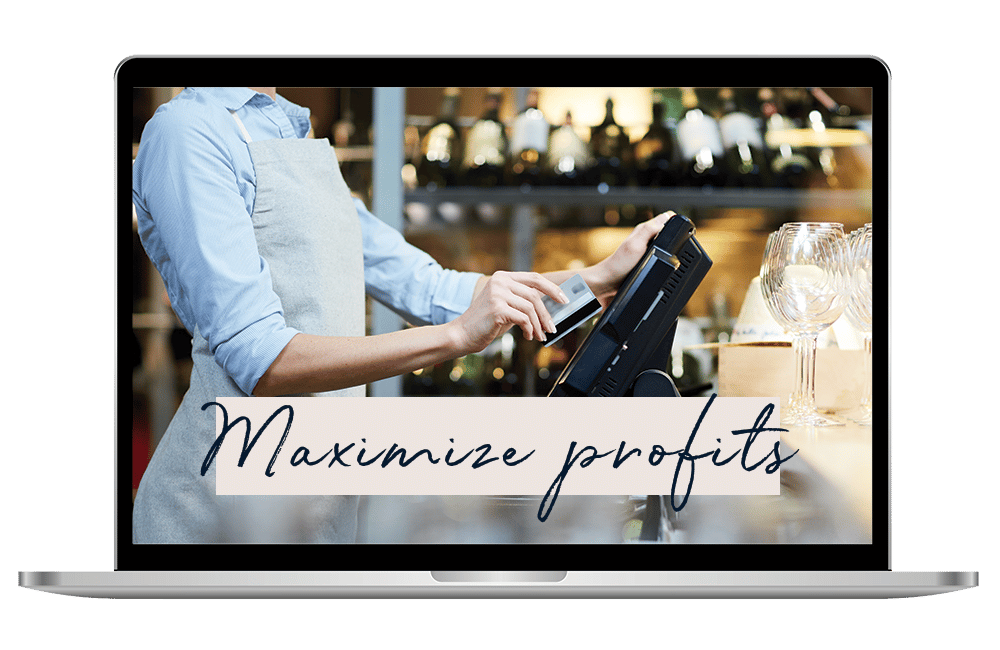
The three costly mistakes you could unknowingly be making?
Find out in this FREE guide and restaurant assessment specifically designed to reveal the unexpected hurdles standing between you and exponential business growth.
Thank You To Our Sponsors
Did You Know That 7 out of 10 Adults Dine Out To Celebrate Birthdays?
You Can Easily Capture This Lucrative Business!
Your operations base camp that scales standard procedures, trains your team, controls operations, and even manages food safety.
Get white glove service with FREE onboarding and implementation.
For a limited time only, popmenu is offering our listeners $100 off your first month plus an unchanging lifetime rate.
Request a DEMO:
Want to become a podcast sponsor?
Please get in touch with Roger at roger@restaurantrockstars.com
